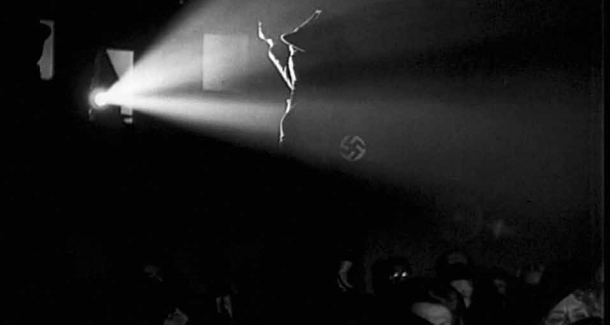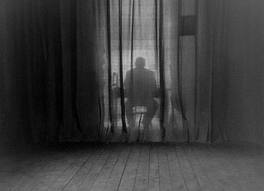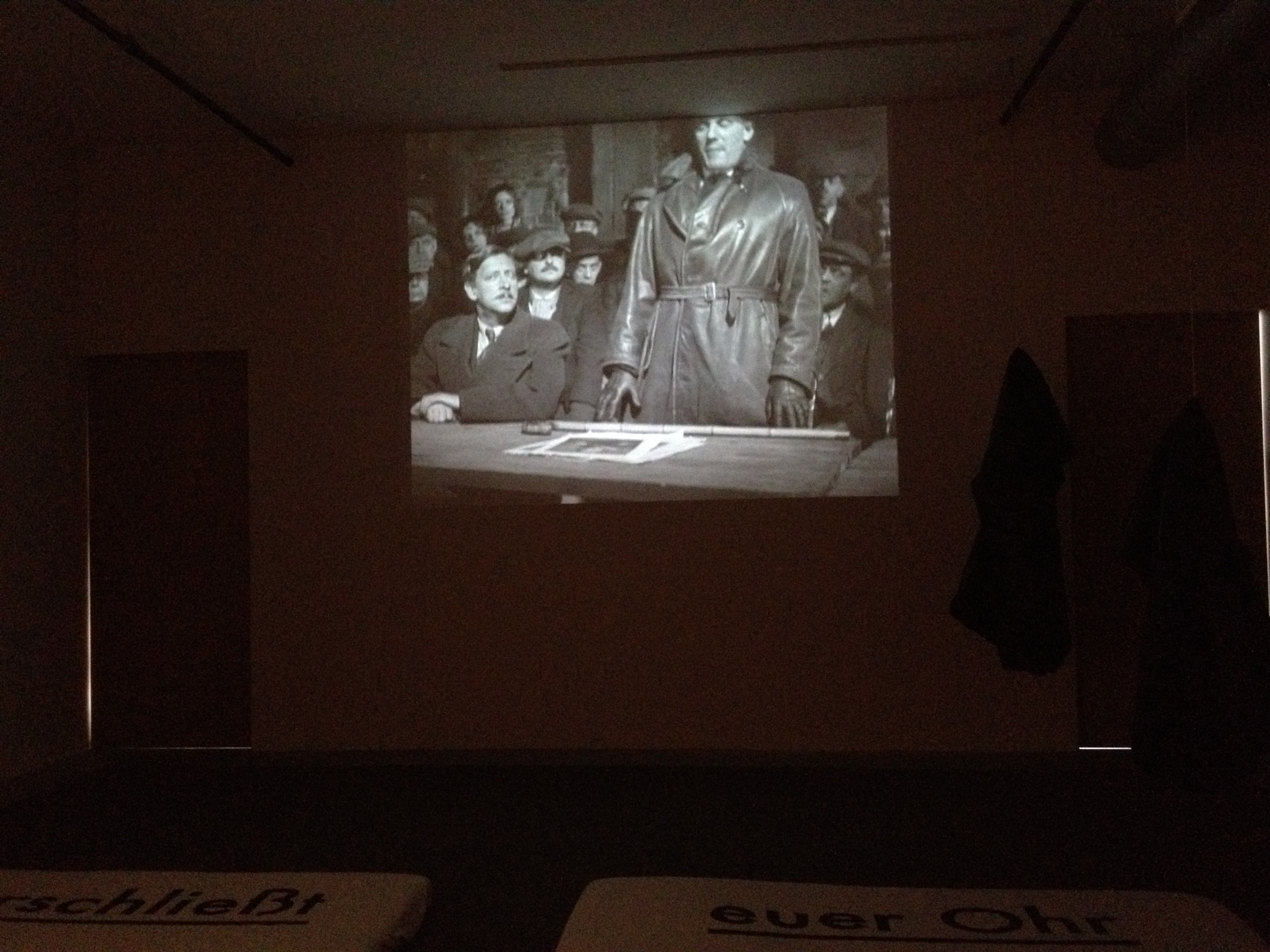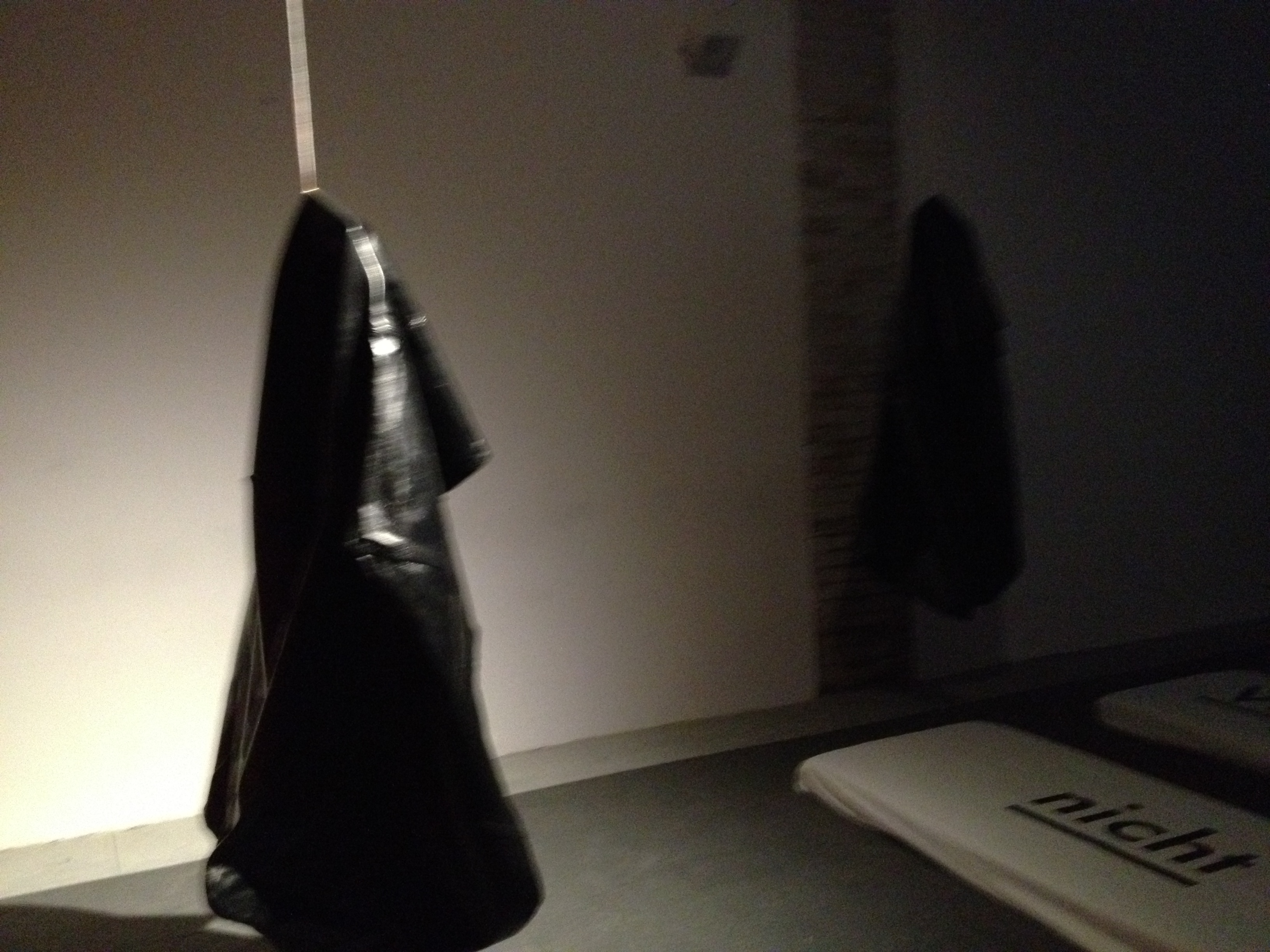
Still from Hangmen Also Die! (Fritz Lang, 1943)
Per-Oskar Leu's Crisis and Critique consists of a video of trial scenes selected from German films from the 1930s and '40s, leather coats hung over speakers sometimes playing Bertolt Brecht's 1947 testimony to the House Un-American Activities Committee, and four mattressed seating areas with the German words for locked up, night, your ears, and misfortune printed on them. Presented in a curtained-off room, the installation at 155 Freeman Street was accompanied by a newly translated essay by Otto Freundlich entitled "The Artist and the Economic Crisis." The sum of these parts might make for an ominous, harrowing piece, which by its content, it is. It's also an insightful and engaging installation on the role of the artist and art in the whole mixed-layered world at large.
'At large' is apt as Leu, in the show's press release, cites an investigation of Verfremdungseffekt—distancing effect—in relation to the experiences of Bertolt Brecht. The video of trials in German cinema demonstrate how the format of a trial flattens the dimensions of an individual, with the defendent often used as a tool to prove a political point or create legal precedence. The transcript and audio recording of Brecht's testimony before the Committee is rich with content, displaying the State’s fear of insurgence, problems with translation and misinterpretation, and a reminder of art’s ability to incite. Brecht's words in songs and poems, the primary reason for his appearance in Washington, D.C., were quoted to him (in poor translations, he stated to comic effect) during his testimony. His appearance, along with those of so many artists and others during the McCarthy years, serves as a reminder that critical thought can be powerful and dangerous. Poets, writers and artists who are watched and imprisoned in authoritarian regimes incur such behavior most often not because of political activity per se, but because their cultural output is suggestive of underlying, subversive thoughts. Testament to a delicately balanced perception we have of the individual is that seems ludicrous at present in the West. But it might also be due to a perception of art as ineffectual, and that something so distant and harmless isn't cause for concern.

Still from Das Testament des Dr Mabuse (Fritz Lang, 1933)
Installation view of Crisis and Critique (Per-Oskar Leu, 2012) at Triple Canopy
Negar Azimi's incisive piece in Frieze last spring discussed the effects of different political and art forms. Political subject matter, though well-meaning, can suffer from its safe distance from its presented topic. The article mentions Liam Gillick's recommendation that the best way an artist can be political is to "occasionally step outside their normal practice and stand as citizens against the delusions of their leaders" and presents Adrian Piper's definition of "Easy Listening Art," art that "provides enough compositional sophistication to engage or titillate one’s visual sensibilities, but its impact is deliberately muted...suggestive rather than explicit, soothing rather than demanding...It does not make trouble, instead it makes nice." Piper's "Easy Listening" pejorative may seem a bit unfair to scores of perfectly good work, but in the face of the zeitgeist, (the article was published in the midst of a flourishing period for the Arab Spring movement, but before Occupy Wall Street), our consciousness has shifted to increasingly realistic and substantial concerns. Azimi suggests art "in the name of the political" be less stultifying, more electric: that it ask unanswerable questions, perhaps be uncomfortable, and that it not ‘make nice.’ Though rousing, those objectives sound as if they would make for ominous, harrowing, and difficult work. However, concrete reality benefits from an artist's abstract gaze upon it. Now is a better time than many to welcome resonant work that asks nuanced questions and presents altered perspectives.
Installation view of Crisis and Critique (Per-Oskar Leu, 2012) at Triple Canopy
An artist seeking guidance in this political moment would find a good deal already thought out by Otto Freundlich, a German-Jewish artist and politically active Marxist. Leu's inclusion of the 1931 essay (appearing for the first time in English; much of Freundlich's work was destroyed after the Nazi takeover of Germany in 1933; he was murdered upon arrival at Majdanek concentration camp in 1943) broadens his installation with a high-minded, yet realistic directive on the artist's role in history. We can identify with the circumstances under which it was written: in an increasingly impoverished nation where an artist's lot depended on chance, and that chance diminished in correlation with economic decline. Freundlich writes of an artist that has integrity and value because he has a creed. The essay is full of gems: the artist has an "inner decisiveness" and "an obligation to demand the utmost of his own discernment." He must remain true, and "serve that great formative and transformative process" to ensure that "there is no economic crisis capable of suffocating true enthusiasm for the free play of creative ideas." The value in an artist's life comes from his "surrender to that particular artistic truth that he perceives to be his guiding principle." And with selective optimism, "the economic crisis, so disheartening to those spoiled by indulgence, spurs the creative and defiant spirit, which believes in the future."
Installation view of Crisis and Critique (Per-Oskar Leu, 2012) at Triple Canopy
Leu's own response to his question on the role an artist should "play during watershed political moments" is in line with Freundlich's artist. Crisis and Critique encourages inquiry, reflection, and action, and stresses the importance of artistic thought and criticality in changing times. While, like Freundlich and his work, the artist and art might not physically survive, the artist’s endurance may be found in being one who (again, from Freundlich) "looks upon the struggle of his age and his contemporaries as his own most personal destiny, lending it expression."




